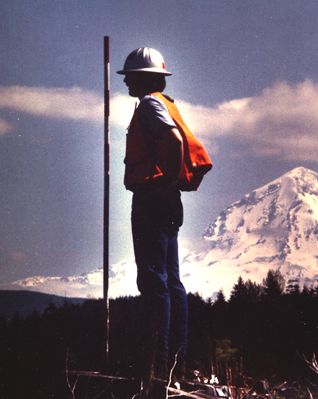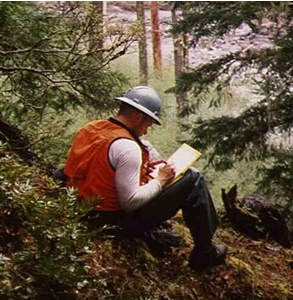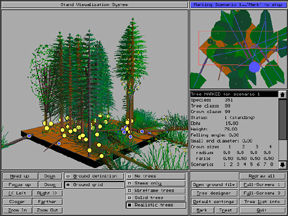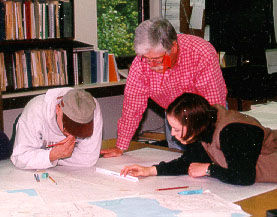
If you are interested in:
- a career in natural resources
- environmental design
- forest operation
- watershed analysis/design/restoration
- a
choice of urban/rural living
then...
FOREST & ECOLOGICAL ENGINEERING
can help you meet your career goals.
a
cooperative program with the College
of Forest Resources and the
College of Engineering, University
of Washington.
FOREST & ECOLOGICAL ENGINEERING

Mountain forests are valuable resources providing wood, water, wildlife & fish habitat and scenic quality. Maintaining those scenic, protective and productive values requires skillful application of forest & ecological engineering knowledge in order to sustain and enhance those resources.
The Forest & Ecological Engineering program at the University of Washington is the oldest such program in the United States. It was started in 1911 by Professor Elias T. Clark at the urging and request of the forest industry. In fact, the forest & ecological engineering profession was born here, in recognition of the special needs of combining engineering principles with an understanding of forest resources in the Pacific Northwest.
The Forest & Ecological Engineering program is jointly administered by the College of Forest Resources and the College of Engineering. It resides within the Forest Management and Engineering Division of the College of Forest Resources. This reflects the unique cross between engineering and natural resources discipline. The Forest & Ecological Engineering program at the University of Washington is relatively small with a target enrollment of 20 students per graduating class, which insures direct faculty contact.
 WHAT
ARE THE OBJECTIVES OF THE FOREST & ECOLOGICAL ENGINEERING PROGRAM?
WHAT
ARE THE OBJECTIVES OF THE FOREST & ECOLOGICAL ENGINEERING PROGRAM?
The Forest and Ecological Engineering (FEE) Program at the University of Washington has a mission to discover, adapt, and disseminate knowledge and technologies in the broadly defined area of forest and ecological engineering. The program focuses on engineering design for facilitating forest and forested watershed management, protection, harvest and transportation to meet the needs and constraints of society.
The three specific objectives the program seeks to achieve are:
1. Insure students have essential knowledge and basic skills required for careers and/or postgraduate study in Forest and Ecological Engineering.
2. Develop the student's ability to creatively resolve problems and exercise sound professional judgement in open-ended projects.
3. Provide students with a broad, general education that will promote their intellectual maturity and allow them to contribute to society at large.
There are nine components to the program:
| Area | Credits | |
|---|---|---|
| 1. | Mathematics | 24 |
| 2. | Basic Natural Sciences | 25 |
| 3. | Basic Writen & Oral Communication | 12 |
| 4. | Basic Engineering and Computing Fundamentals | 24 |
| 5. | Forest Engineering Core | 34 |
| 6. | Capstone Design Sequence | 9 |
| 7. | Forest Engineering Technical Electives | 25 |
| 8. | Humanities and Social Sciences (VLPA and I&S) electives | 21 |
| 9. | Unrestricted Electives | 6 |
HOW DO I PREPARE FOR A CAREER IN FOREST & ECOLOGICAL ENGINEERING?
While the first two years of the Forest & Ecological Engineering curriculum are consistent with pre-engineering status within the University, and the core Forest & Ecological Engineering courses begin in the junior year, design is a theme that is emphasized throughout the program. The design theme culminates in the senior year when all Forest & Ecological Engineering students participate in a capstone design project, either "on-campus" or at Pack Forest
THE FOREST & ECOLOGICAL ENGINEERING PROGRAM OPTIONS
 Electives
are chosen to fall into one of three options:
Electives
are chosen to fall into one of three options:
| 1. Environmental
& Operational Analysis
& Design; 2. Geographic Information Systems & Remote Sensing; or 3. Eological Engineering. |
The curriculum in Forest & Ecological Engineering leading to the Bachelor of Science degree is accreditated by the Accreditation Board for Engineering and Technology (ABET). ABET is recognized by the Council on Post secondary Accreditation and the U.S. Department of Education as the accrediting agency for engineering education in the United States.
WILL MY COURSE WORK INCLUDE RELEVANT DESIGN & FIELD EXPERIENCES?
Forest engineering design is emphasized through out the program. However, design is a topic that is discussed more than it is exercised until the senior-year courses culminating in a capstone design project in teh Spring Quarter of their senior year.
This unique capstone design course allows the student to participate in a real-life, team-oriented design project combining most, if not all, aspects of their previous studies. Students can participate in an "on-campus" or the "Pack Forest" version of the capstone project. Cooperating closely with the sponsoring landowners, the seniors complete a watershed resource development and transportation plan for a large forested area with extensive exposure to computer technology, environmental assessment methods, road location and design and forest operations.
WHAT ARE MY PROFESSIONAL TRAINING OPPORTUNITIES?
Job placement depends largely on a good record of relevant work experience. The College of Forest Resources has agreements with the U.S.Forest Service, the Department of Natural Resources, and private industry creating salaried internships which provide work experience in the forest & ecological engineering field.
WHERE WILL I FIND EMPLOYMENT AFTER GRADUATION?
Past graduates have chosen diverse pathways. Post-graduate education is common in Forest & Ecological Engineering or other engineering fields as well as in business admininstration and other natural resources areas. Employment at the B.S. level has been with city, county, state and federal agencies (in both forestry and engineering), consulting firms, heavy equipment manufacturers and large industrial timberland companies. Graduates have opportunities in both urban and rural settings. Our record demonstrates that the Forest & Ecological Engineering curriculum provides a great deal of flexibility in future education and career pathways.
HOW CAN I GET MORE INFORMATION ABOUT FOREST & ECOLOGICAL ENGINEERING?
To learn more about the forest & ecological engineering program at the University of Washington, you are welcome to talk to any of our FE faculty, or drop in and see our student advisors in:
Student
Services Office
University of Washington
College of Forest
Resources
Box 352100
Seattle, Washington 98195-2100
(206) 543-7081
Engineering
Advising Center
University of Washington
College of Engineering
Box 352181
Seattle, Washington 98195-2181
(206) 543-1770